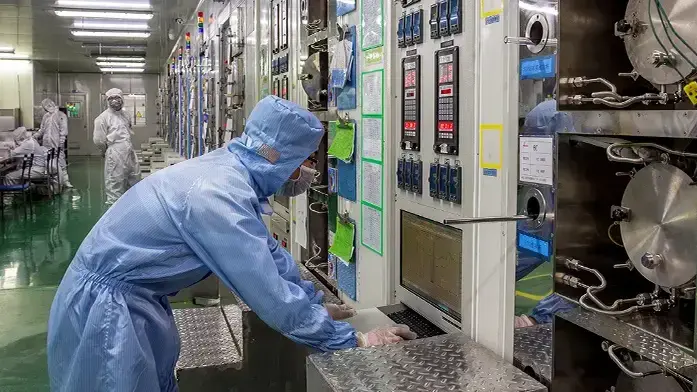Not all of them like Apple: that's why the chip industry manages to mitigate the corona
Apple's revenue warning about the implications of the Corona virus raises concerns about the supply chain in the chip industry. Sergei Veszonok, a senior analyst at Oppenheimer, is quite reassuring: "Many companies have withdrawn production from China because of the trade war." Is there anything to fear though?
Apple's announcement that it will not meet its revenue forecast because of the effects of the Corona virus on China's economic activity was relatively predictable. Already a few days ago, analysts had predicted that due to Apple's high exposure to China - both on the production side in the country that is hurting iPhone sales worldwide and on the consumer side in China itself - the rate of production could shrink by about 5% to 10%.
Still, Apple's announcement weighs a bit on the company's stock (down 1.8%) and some of the indices (such as the SOX index, which centers on chip companies and fell 1.4%). The reason, in part, is because the effects of the Corona virus have already been taken in its original revenue forecast, but apparently not enough. The fact that the first significant news of actual sales damage comes from the technology giant is a cause for concern and concern. This is because it is the first significant signal of a crisis that may develop due to the partial disruption of the world's manufacturing plant rape, as China is called.
The concern is that as time goes on during which China's production rate slows down or stops, the risk of global trade damage increases. Another concern is that the first companies to be hit will be companies, such as Apple, which have a significant portion of their production power or target market in China.
Judging from a study conducted by LLamasoft that tested the sensitivity of supply chains to various industries around the world - the concern now is that Apple is just the first swallow. According to LLamasoft, the high-tech industry is more susceptible to supply chain damage compared to industries such as retail, automotive, pharma and others. Sensitivity is reflected in two parameters - the availability of inventory that companies hold, and the existence of alternative sources of supply. The tech industry has far less breathing space and fewer alternatives to delivering the components it needs.
The current crisis is not the first global crisis in Asia that hits the global supply chain, and the world has already shown remarkable recovery capacity, from the SARS crisis in the early 2000s to the tsunami. On the other hand, today the world depends on manufacturing in China more than ever. The province affected in China is significant in manufacturing important components to the smartphone world (mainly memories of the telecom world), optical fiber and the automotive world.
The war on Wawai paid off?
How sensitive is the global and local electronics industry to China's manufacturing capacity, and how true is the Apple case? Sergei Veszonok, a senior analyst at Oppenheimer, is trying to quell concerns, explaining that in terms of global trade impacts, dealing with the Corona crisis can be seen as a continuation of the China-US trade war, much of which directly touched the chip industry.
According to Vaschonok, it was precisely through the trade war that the industry was more prepared for the Corona crisis. "The steps companies have taken to protect themselves from the effects of the trade war are very beneficial to them today," he explains. "For example, due to a 25% increase in tariffs on goods from China, many companies moved their production from China to other places such as Vietnam or the Philippines, and Apple was among the The first to do so. "
In the specific chip market, Veschonok explains, the risk of the supply chain is not particularly severe because it is "one of the few areas in which the United States holds a competitive edge. On the one hand, during the trade wars many chip companies stopped selling to China, and on the other, buying less from them - there was a boycott of ZTE and later also of Wawi, which caused the US to buy from other suppliers, especially in Europe. "
These are not the only reasons why Veszonok's case is Apple's point. According to him, "Apple's problems may be more related to market share and less weakness in the entire market. For five years now that the cellular market is not growing in terms of units sold, it is difficult to separate what is due to the corona and what is due to a general slowdown in the cellular market."
Veszonok also notes that the signs of a slowdown have not yet reached the official publications of Israeli chip companies. According to him, "CamTech released a forecast that it will not be affected by Corona," while Nova took into account the impact of the Corona in the forecast for the next quarter. Israeli Tower also does not see a significant impact from the virus in the forecast for Q1 2020, beyond just one percent of its revenue. "
"The chipset companies and chipset equipment from the US, such as KLA that bought Orbotech or Annabydia that buys Melanox, have stated in their reports that they do not see the impact of the spread of the virus on their businesses," Veszonok added. A slowdown in the current quarter is expected to increase in the following quarter.
Were fillers helping or not?
If so, what are the latest features of the chip market that could cause it to become over-sensitive to the crisis? Hanoch Melis, CEO of CM Electronics, which operates in the field of printed circuits, explains in a conversation with "Globes" that one of the weak points is the inventory problem. Over the past two years, Melis has reduced the price of money due to low interest rates Less motivation to keep large inventory The trend today, he explains, is to get the component and put it right on the product, a trend known as "just-in-time manufacturing".
According to Melis, manufacturers are measured by logistics capability, which is measured in part by the number of months the inventory is supposed to suffice. A manufacturer that holds too much stock, Melis argues, will transmit weakness because it is perceived as having not properly designed its business. As a result, if the level of inventory in the past was about six months, it now stands every two or three months.
Would increasing inventory have prevented supply chain damage during a crisis? Not sure either. According to Melis, the answer is not necessarily positive. Even if the manufacturers were large in size by the industry, they would still be very sensitive to any malfunction or delay: "In the resulting situation, even if the manufacturers had six months, enough is missing one component to disrupt the work. In the case of simple components it is possible to set up new factories "But with complex components like Intel processors, for example, the time required to set up a factory is significantly longer."









